In horror films, a squeaky floor usually indicates the presence of paranormal activities but in real life when your floor squeaks it’s usually because of some humdrum, easily fixable problem. However, not all squeaks are innocuous and it’s important to be aware of when you should worry about squeaky floors.
Together, we will explore normal and problematic causes of squeaky, how to tell when something is amiss, and how squeaky floors can cause problems, even if the squeaks are considered to be normal.

It is relatively normal for wooden floors and subfloors to squeak. But squeaky floors can indicate an issue if the squeak is accompanied by a spongy feeling, occurs in very old or very new houses, the house is in seismically active areas, or a loud squeak suddenly develops.
Floors Can Squeak
Sometimes it is normal for floors to squeak because of movement. As the name suggests, movement means that when you step on your floor, there’s friction on the floorboard, which causes the floor to squeak and creak.
When the floor squeaks, it means the floorboard is loose and it is brushing against another board, nail, or a joist. There are various factors responsible for the squeaking of the floor. Some are normal and some you should take very seriously.
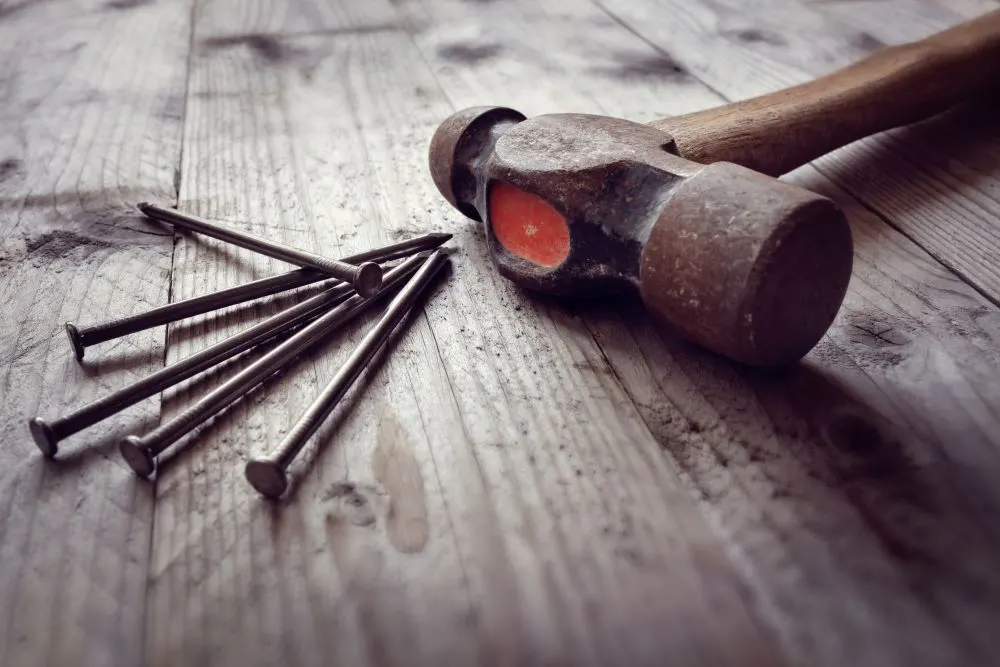
Normal Reasons for Squeaking Floors
Just like you alter your lifestyle choices depending on the season, some floors squeak due to the change in the season. And, that’s normal. Woods contract and expand depending on the season and this is usually unavoidable.
You will face weather-related problems especially if your floor is made of solid wood. Engineered wood floors are made to be weather-resistant, hence, they survive the seasonal wear and tear. During winter, your wood floors will shrink and the summer will see them expanding.
High levels of moisture and humidity cause hardwood floors to warp, which makes them shrink or expand. The contraction and expansion make the floorboard loose and cause tension on the fastener. So, whenever you walk on the floor, your floor squeaks.
Even though it is normal, too much expansion and contraction can make your floor loose enough to detach it from the subfloor. The best remedy for this is opting for a weatherproof seal and reattaching your flooring using some good screws.
If the squeaks are becoming annoying to you and your family, but because there is no structural problem, you can’t spare the money to mend them, then you can consider laying carpets and rugs down to muffle the sounds and spread the pressure of each footfall over a larger surface area.
Squeaking Can Indicate Issues
Your floor squeaking can actually be quite similar to you shrieking in pain. A squeaking and creaking floor indicate issues that must be fixed for the well-being of your home. And the constant squeaking can get very frustrating for you and all the other residents.
So, what exactly are the probable issues that your floor can have when it squeaks? Squeaking happens when the floorboard is loose. The reason for this is what you need to find out and remedy.
Excessive Space in the Subfloor
The foundation underneath the flooring is called the subfloor. You could have any kind of flooring but subfloors are usually made of wood. Hardwood, laminate, tiles, carpeting, etc., are installed on top of a wooden subfloor.
If your subfloor has problems then your floor will make noise. Commonly, subfloors mostly have problems with excessive space. While installing, if there’s a gap between the subfloor and the joist then when applied pressure your floor will squeak.
Many factors contribute to the unnecessary space between the subfloor and the joist. If the subfloor is not installed at the center of the joists or the top of the joists is not even, then this will cause a gap and will make the floor squeak whenever someone walks over that area.
The reason why this can be a problem is that pressure can be placed on the wrong parts of the floor, the parts that were not meant to hold any significant weight. These can then crack or break completely, compromising the integrity of the floor and endangering those who walk on it.
Incorrect Fasteners Used
Sometimes the floor squeaking is due to the usage of wrong nails for securing the floor to the joists. This leads to the floorboard being loose and prone to movement. Sometimes, the nails holding the sheathing in place become loose due to a cracked or damaged joist.
If your floors are not actually secured, then they can slip and move, which makes it dangerous to walk over. Loose nails and screws can also work their way to the top surface of the floor and cut into bare feet and paws.
Floor is Not Level or Supported
During construction, if workers have left debris and residues on the subfloor then this will cause a part of your floor to be uneven and hanging in the air. This will cause your floor to squeak every time you walk on it.
As you can imagine, if parts of your floor are not actually supported, or are unevenly supported, then this can also put undue pressure on portions of the floor, ultimately resulting in breakages.
Materials are Subpar
If your subfloor is of bad quality then chances are it will easily get damaged due to excess rain or humidity. This is why you should not skimp on the bones of the house. Pressure-treated wood is ideal for interior framing as it is resistant to moisture, which causes squeaky floors.
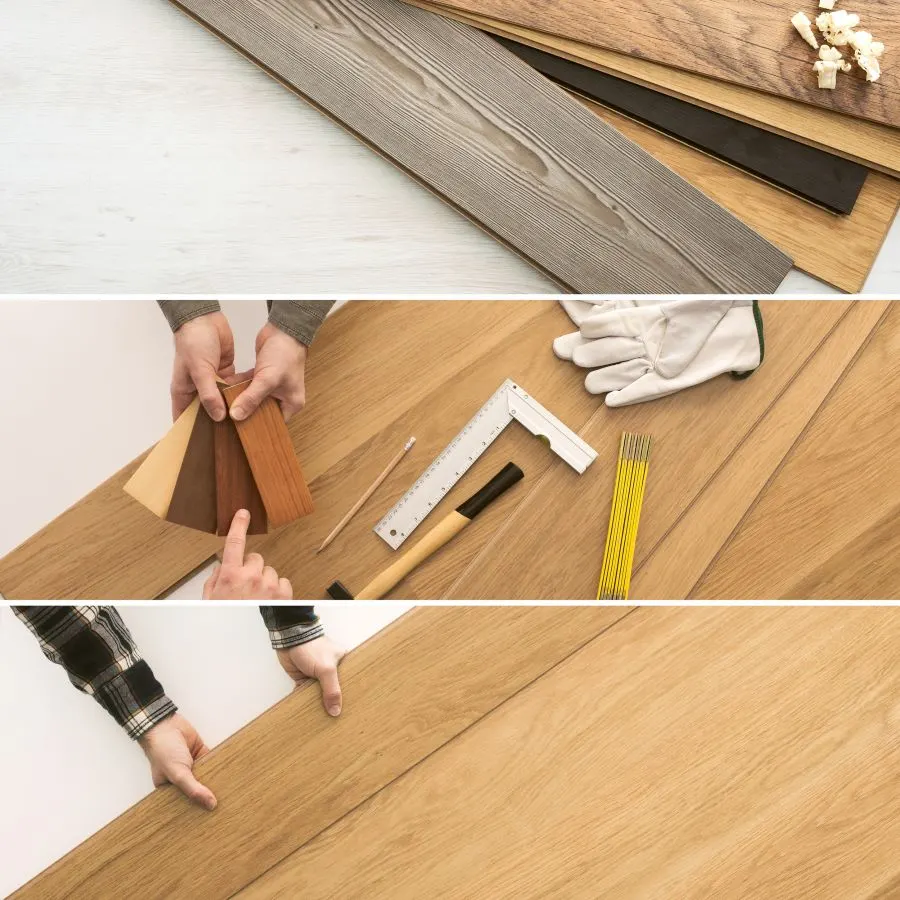
All the problems mentioned are somewhat related to bad quality workmanship. Most of these problems can be easily avoided if you only hire certified experts for installing your floors.
Termites Have Infested the Floor

Squeaking floors don’t always indicate that a floor is infested with termites, but floors infested with termites will almost always squeak. Other signs to look for include hollow sounding boards, blistering/peeling paint, piles of sawdust, buckling floorboards, holes in the carpet, live termites in carpet.
Squeaking Can Indicate Termites: Why?
You’re walking through your house and you pass over that same spot that always seems to create an unruly squeak. It could possibly be due to the age of the floorboards if you live in a relatively old home, or the contraction and expansion of the wood as the temperature changes throughout the day, but it could also be caused by the dreaded termites!
As you know, termites feed on wood and moisture, so if termites have begun to attack your floorboards, then you may experience squeaking at the location of the damage.
This is due to the fact that termites tend to be attracted to the softer wood underneath, such as the floor supports or subfloor. The termites have now weakened that specific site in your home through their tireless gnawing at the wood.
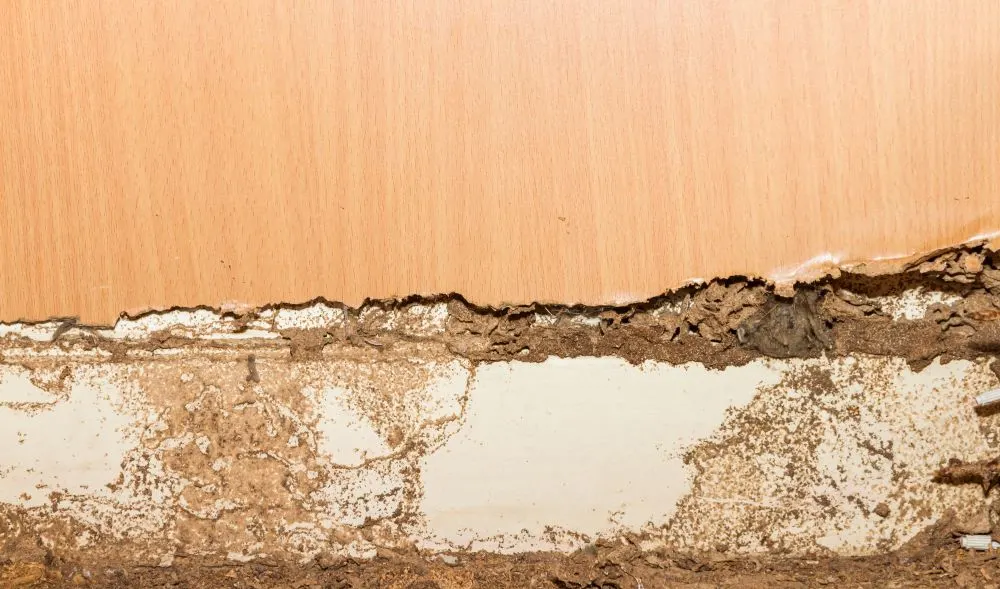
Once the area becomes weak, it becomes much more susceptible to even the smallest movement. The squeaky noise comes from the weakened floorboards or nails rubbing against each other as you take a step and cause them to shift.
Termites can become a prolific problem in a house constructed mainly of wood. This is one of the reasons a squeaky floor can cause buyers to walk away from the home, even if the squeaks have perfectly innocuous origins.
Other Signs to Look out For
Termite damage can represent itself in a variety of ways, other than squeaky floors, so it is important to be aware of the other signs to look out for so that you can prevent extensive damage to your floors and home. Knowing what else to look for can also help you know if you should be worried about your squeaky floor or not.
One sign to look out for is if any wooden areas of your home sound hollow or empty when knocked. This hollow sound could indicate that termites have completely consumed the wood underneath the area, and depending on the damage, you might even be able to break right through the wood quite easily.
Another characteristic of termite damage that you should be aware of is if your wooden floors appear to have water damage, when there is really no indication that it should be occurring. Some termites will leave behind paint peeling or a ‘blistering’ appearance on your floors or walls that appear to be water damage but on closer inspection, is not.
If you start to notice a lot of small piles of sawdust around your home, it might be time for further inspection as these can be the after effects of termites. You might also see small insect wings around your home, which could be the discarded wings from the termites.
Another sign of a possible termite infestation is the appearance of buckling floorboards. If your floorboards appear to be lifted at the edges, or just not fitting quite right, then you could have a termite infestation on your hands.
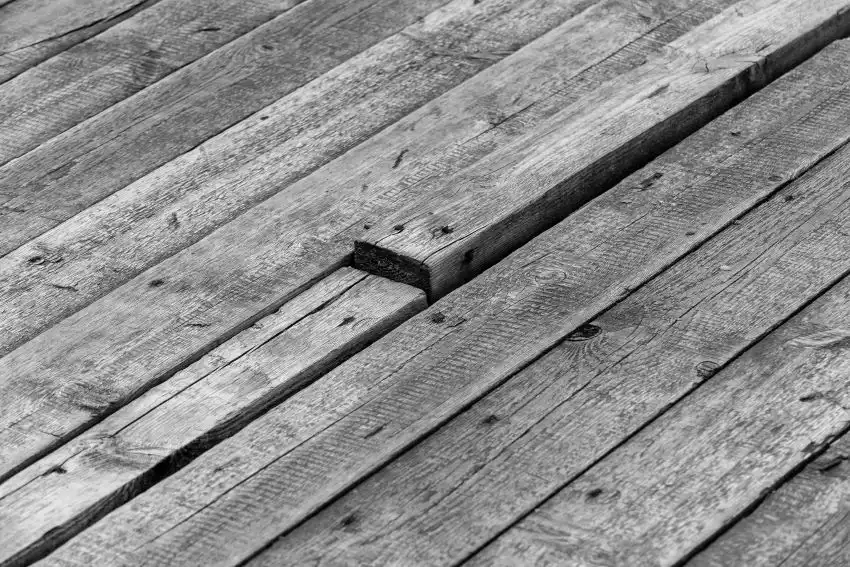
If you have carpeting covering your wooden floors, then obviously identifying termites using the above signs might prove a little difficult. If you are lucky (or rather, unlucky), you will be able to see live termites crawling around your carpet. You might also notice some holes in your carpet as the termites eat through the fibers, or you could hear some squeaking as you step on certain areas.
Treating Termites in Wood Flooring
So, you have identified that you have termites, possibly by noticing one of the many signs outlined above. Now comes the more complicated part of treating the problem.
If you caught the infestation at the earlier stages, then you could get away with a good extermination effort and a few minor repairs that you can do yourself, without the need for hiring a professional.
One way to kill termites in your flooring would be to use a liquid chemical termite barrier, ultimately a pesticide, around the foundation of your home and other affected areas. This can also be used as a preventative measure, so you can apply it even before you see termite damage just to be safe.
A cheaper and less toxic alternative would be to use Boric Acid (amazon link) in its powder form and spread the powder evenly along your wooden flooring. Within a week the termites should all be killed.
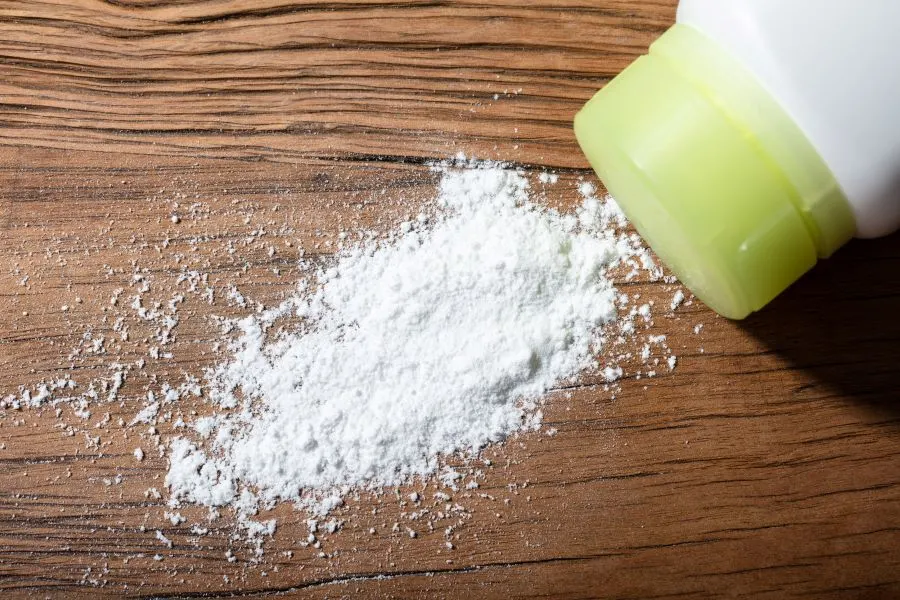
If you are unfortunately the victim of an intense infestation of termites, you might need to fumigate the entire house, possibly making use of Vikane gas, and then address the damage.
Normal Squeak or Ominous Squeak?
As mentioned in the previous section, your floor could squeak because of various reasons, which can easily be fixed. So, when should you really be concerned?
Spongy Feeling is an Issue
Sometimes squeaking is accompanied by a spongy or bouncy feeling to the wood that might indicate that they are rotting and therefore weak.
On the ground and basement floors, there is a high chance that this moisture is coming from the foundation. When you have a problem with your foundation, then along with uneven floors or soft spots on the floor, other problems like cracks in tiling, bulging walls, or warped window or door frames might also be there.
Age of the House Can be an Indication
Finding squeaky floors is natural in very old houses as over time the floorboard dries up and there is a shift or settlement in the foundation. This usually happens when the soil shifts underneath causing the foundation to move. However, if your house is very old, then it would be worthwhile getting someone in to look at them.
If you have a new build and your floors are squeaking, then it may indicate an issue as new houses should not have squeaky floors. New floors do need time to settle in but make sure your contractor is aware of the issue and is prepared to take steps if the squeaking does not resolve itself.
Do You Live in a Seismically Active Area?
When there is movement in the foundation of your house, the subfloor, on which the floor is placed, gets affected. This causes your floor to squeak. Over time, the movement or shift in the foundation increases causing damage to the subfloor and resulting in floors squeaking.
If you live in an area that experiences quite a lot of tectonic activity, then squeaks should be investigated.
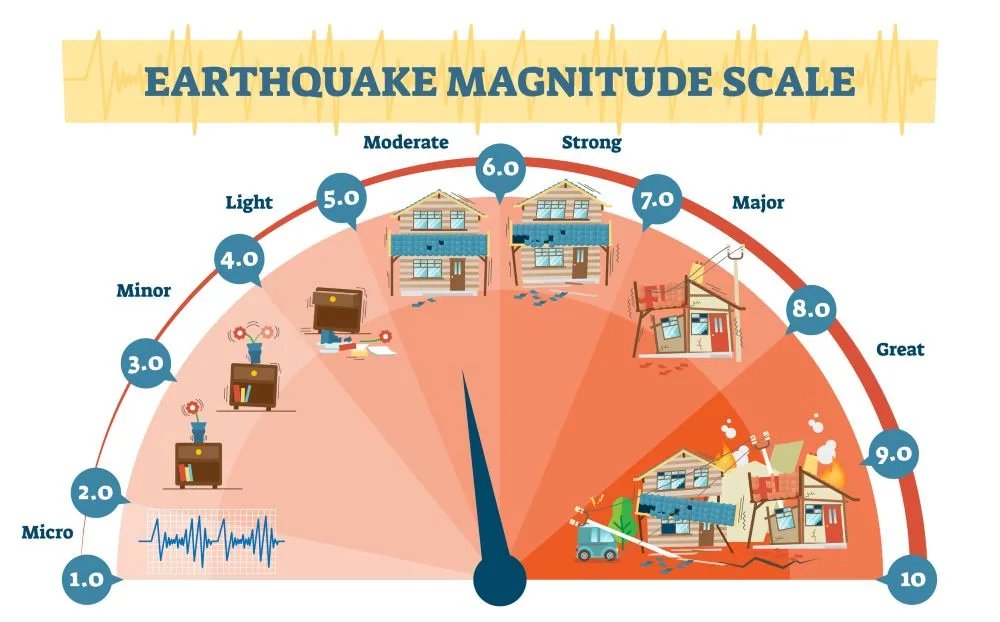
Sudden and Noticeable Squeaks Can Indicate an Issue
If you step on a portion of your floor and you hear a loud squeak where yesterday there was none, then this can indicate that there is something structurally wrong and you should investigate. Normal squeaks tend to develop slowly over time.
Other Signs of Termites
Squeaking is not a guaranteed sign of termites, but you are unlikely to have termites in your floor and not hear squeaking. As such, any squeaks should be checked out for more entomological causes. This does not have to involve a professional, however. There are several signs that you can look out for. I have detailed these in Are Squeaky Floors a Sign of Termites.
Seasonal Squeaks Not Likely to Point to Problem
If your floor squeaks during the rainy season but is quiet for the rest of the year, then this means that your floors are only responding to the increased humidity in the area.
There are a few ways of making sure that your floor doesn’t squeak at all in response to the weather. While putting the floor, ensure that only good quality material is used and the installation is done by certified professionals. You can take measures so that your floor is resistant to seasonal wear and tear.
If the squeaking and creaking of the floor continue for a long time, then you must find the cause and get it fixed.
Use the above information along with that provided in Buying a House With Squeaky Floors (Things to look out for) to help guide you in purchasing a squeaky house.
Squeaky Floor Can Make Neighbors Upset
Even if the squeak is not caused by a problem, it can, itself, cause issues for you and your neighbors. If you have lived underneath someone whose floor squeaks then you would know why this is bound to happen.
You are annoyed by the floorboard noise and so is your neighbor. The first few times your neighbor will tell you politely but if nothing is done, then the situation might get ugly. They might complain to the HOA and then you will be in lots of trouble.

You and your family members might be tiptoeing, or rather walking toe-to-heel across the floor and taking other measures to walk quietly in order to avoid making the floor squeak but that can’t be a permanent solution.
If the HOA gets involved then you will be forced to fix your floors. So, it’s always better to do it when you hear the first squeak. Also, if you get it repaired before more damage is done then it might be cheaper.
Sources
https://albuquerque.floorcoveringsinternational.com/articles/reasons-for-squeaky-floors/
https://www.innerspaceflooring.co.uk/blog/how-to-fix-creaking-floorboards
https://www.realtor.com/advice/home-improvement/how-to-fix-squeaky-floors/
https://www.thisoldhouse.com/flooring/21015195/how-to-fix-squeaky-floors

